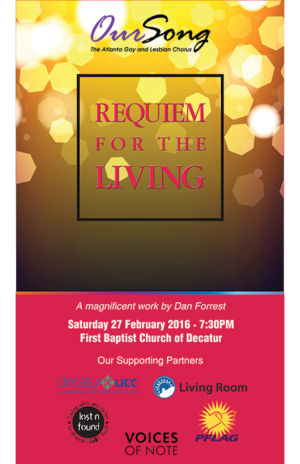Wait a minute, aren’t *all* requiems for the living, technically? I mean, who are the singers, the instrumentalists, or the audience members if not the living? (If the person in the audience next to you is deceased, the performance may have bigger problems.)
Dan Forrest calls his composition Requiem for the Living because he is making a distinction from traditional requiems, which originated as masses for the dead. (The word requiem is, of course, Latin for “rest” or “repose.” R.I.P. May they rest in peace.) Many hundreds of years ago, the masses would have been based on homophonic liturgical chant. Since as early as the 16th century, however, composers have used the form as a setting for more complex musical expression, so much so that it eventually morphed into its own musical genre. In the 18th and 19th centuries, the genre was elevated to an art form, and the compositions began to take on such complexity that they could no longer comfortably be used in an actual funeral service!
There are (literally!) thousands of requiems, composed across many centuries and for many different occasions. Some composers use only the traditional liturgical text (or portions thereof) in Latin. Others employ portions of the liturgical text in other languages. Still other composers incorporate additional sacred or secular texts, as in the case of Brahms, who used the German Luther bible to compose his Ein Deutches Requiem, or Britten, who incorporated the poetry of Wilfred Owen with the traditional Latin text in his War Requiem.
If there are thousands of requiems, what makes Requiem for the Living different? Why give attention to this particular work? It isn’t that the work itself has shattered the norms of the genre; rather, Forrest puts a delicate twist into his work that raises the question: for whom is this intended? What sets his work apart is neither the text nor the music, but rather his intention—to ask for rest and mercy for the living. (Did you notice that Dan Forrest’s last name is “For Rest”? Perhaps he was born to pen this requiem.)
In the first movement, he uses the traditional “Introit” and “Kyrie” texts; while traditionally those texts in a requiem ask for mercy for the deceased, Forrest’s plea is for mercy for the living. In the second movement, “Vanitas Vanitatum,” he departs from the traditional liturgical text with passages from the Biblical books of Ecclesiastes and Job. The movement intends to portray human suffering while on earth. In the third movement, “Agnus Dei,” Forrest returns to the traditional text, but places this text rather earlier than it would fall in the typical requiem form. This is the first movement in the piece with a soloist, which adds another texture and a very human voice to the plea, “grant them rest.”
In the fourth movement, “Sanctus,” he uses the traditional text of a requiem mass; this movement has three distinct sections. The text, “heaven and earth are full of your glory,” draws on three inspirations: pictures taken by the Hubble telescope of space, depicting the glory of the universe; pictures taken from the International Space Station, depicting the glory of earth; and a mental image of a bustling city, depicting the glory of God through human life. In the final movement, “Lux Aeterna,” the peaceful music includes the traditional text: God’s “eternal light” shining on the deceased. Here Forrest adds to that traditional text with words from the gospel of Matthew. While this may not be the usual ending to a requiem, the result is a wonderful peacefulness that can be a prayer for the living as well as the dead.
The work is subtle in its intent, nuanced in its treatment, and beautiful and comforting in its effect. OurSong is delighted to be preparing to record and perform this lovely and inspiring work once more. We look forward to performing it February 27 at First Baptist Church of Decatur.
Read more about Requiem for the Living and Dan Forrest, including the text Forrest selected for his work, here: http://www.danforrest.com/requiem/.


